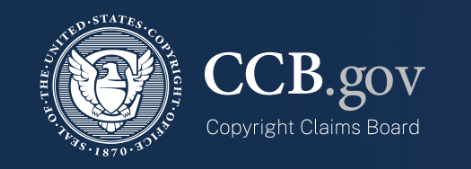
It’s been more than a year since my last post about the now not-so-new Copyright Claims Board (CCB).
Victoria covered the CCB when it first started hearing claims in June 2022, and her post gives a good summary of how it operates and what it is supposed to accomplish. The short version: The CCB was created as a judicial body under the US Copyright Office to administer small copyright claims that would be too expensive and/or time-consuming in federal court.
At the time I confess I was worried about an eventuality that fortunately hasn’t come true. There are vanishingly few copyright trolls trying to use the CCB to collect money from innocent or ignorant individuals by scaring them into paying settlements. On the other hand, it has worked for some business to business claims: Joe Hand Promotions, Inc., a company that “serves as the exclusive distributor of all Ultimate Fighting Championship (UFC) and select boxing pay-per-view programming” is by far the most frequent CCB claimant, with forty-five claims and counting, mainly against bars and restaurants, and many of those are withdrawn from consideration by the CCB and apparently settled privately.
What has happened in the intervening 20 months has been a disappointment for anyone hoping that the CCB would become a useful tool for writers seeking to get redress for infringement of their work. First of all, the number of “literary” claims is still very small, around 10% of total claims, and many of those, as we previously pointed out, are dismissed by the CCB because they weren’t filed correctly or have other flaws. Some are outright bizarre, and I may do a post about them in the future. With others the claimant doesn’t understand that a vendor selling used copies of their books is not a violation of their copyright.
I wrote about what is still the CCB’s single most interesting case of literary infringement back in January 2023. It was identified as Case #2 (Docket #22-CCB-0015) in that post, in which an author (or rather, the author’s incorporated company) had claimed that The Walt Disney Company et. al. had continued to make ebooks of several books of her series available after the contract allowing them to do so had expired. It is still in limbo, unfortunately. The last filing in the case was made on July 15, 2023 and there has been nothing new on the normally quite transparent CCB docket about it since then. In general, all CCB cases are taking longer than might have been expected, but Case #22-CCB-0015, which was originally filed in July 2022 as one of CCB’s first claims, seems to be an outlier with enormous amounts of submitted evidence that shows no sign of a conclusion.
Possibly on the bright side, Case #3 (Docket #22-CCB-0113) in my January 2023 post may have had a happy ending for the author, but we’ll never know for sure. The author claimed that Dorrance Publishing, a vanity publisher about which Writer Beware has written many times, continued to make their book available after the contract had been terminated. Dorrance denied that they had sold the book after the contract was terminated, that the evidence that it was for sale on ApplePlay was misleading, that another site selling the book was a resale, and that, in any case, the statute of limitations had run out. For whatever reasons, though, Dorrance decided to settle, and the author agreed and the case was dismissed with prejudice.
In short, even as its second birthday is only a few months away, it’s still too early to draw conclusions about the efficacy of the CCB when it comes to literary works, especially books. The majority of the claims that it has decided so far involve photographs and, in those cases, it generally is finding in favor of the photographer and awarding reasonable to low damages. But there are still only a handful of contested decisions and none of them involve the kinds of published material that Writer Beware usually deals with.


Thanks for your comments, Jonathan. I find your site, Plagiarism Today, very valuable, especially your analyses of the CCB’s proceedings.
If. I suspect foul play, how can I find out if my work has been compromised?
Can you describe the context–what kind of foul play? Email me if you prefer: beware@sfwa.org.
I’ve covered the CCB a LOT on my site. I’m still drawing conclusions as well but my initial thoughts are that it seems to be finding its strengths.
The first is as a tool for encouraging settlement and negotiation. If two sides are at an impasse on a case, the CCB provides a great, inexpensive and effective framework to structure settlement talks around. I think that’s why a lot of cases are settled and why that’s a good thing.
The second is for dealing with cases against small businesses, such as the ones Joe Hand Promotions have been filing. Such cases may make sense in federal court, but rarely do from a practical stasndpoint. Still, there’s a motivation to participate and either settle or accept the judgment.
Cases against individuals or large businesses seem to result in opt outs. There’s just no practical threat of a full lawsuit. I’m also going to be interested in how many of the default judgments are actually collected.
Lots to think about!